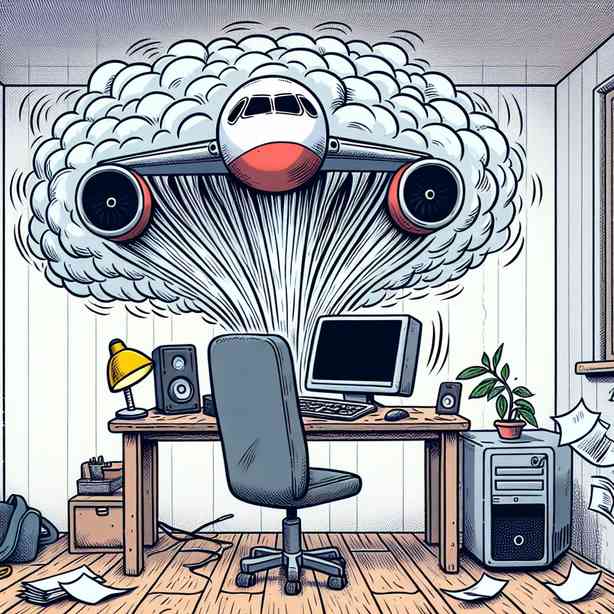
When your PC starts sounding like a jet engine, it can be a cause for concern. The loud whirring or humming sounds can be unsettling and may indicate an underlying issue that requires your attention. In this article, we will explore the various reasons why your computer may be making loud noises, the potential implications of these sounds, and what you can do to troubleshoot and resolve the issues.
There are several components within a PC that can produce noise, but the most common culprits are the fans, hard drives, and power supplies. To start, let’s discuss the role of cooling fans. High-performance PCs often come equipped with multiple fans to maintain optimal temperatures. As these fans operate, especially under load while gaming or running intensive applications, they can spin rapidly to dissipate heat effectively. If you notice a sudden increase in noise, it may be due to the fans working harder than usual.
Another factor that can contribute to loud noises is dust accumulation. Over time, dust can build up on fan blades and in cooling vents, impeding airflow. This blockage can lead the fans to work overtime, generating more noise as they struggle to maintain adequate cooling. Regular maintenance, including cleaning out dust from your computer, can significantly reduce noise levels and improve thermal performance.
In some cases, a malfunctioning fan may be causing the jet-like sound. Fans can develop issues such as unbalanced blades or worn bearings. If the fan is unbalanced, it may wobble as it spins, creating rattling noises. Similarly, when bearings wear out, the fan may produce a loud grinding or chirping sound. If you suspect a faulty fan, it’s important to replace it promptly to prevent overheating and potential damage to your components.
The hard drive is another potential source of noise. Traditional mechanical hard drives (HDDs) contain moving parts, including spinning disks and read-write heads. When a hard drive is in operation, you may hear clicking, spinning, or whirring noises. While some sounds are normal, excessive clicking or grinding can indicate a failing hard drive. If you observe such sounds, it’s crucial to back up your data immediately and consider replacing the drive to avoid data loss.
Additionally, power supplies can also contribute to noise levels. A failing or low-quality power supply may emit a loud humming or buzzing sound. In some instances, the noise might be caused by high-frequency sound waves generated by electrical components within the power supply. If you notice unusual sounds emanating from your power supply, it’s advisable to have it checked or replaced to ensure the stability of your system.
Another factor that can exacerbate noise levels is the overall placement of your computer. If your PC is situated in a confined space or on a hard surface, such as a wooden desk, the sounds may resonate louder than they would in an open area. To minimize noise, you can try placing your PC on a soft mat or in an open area where sound can dissipate more effectively.
If non-fan components, such as the graphics card, are unable to cool efficiently, they may also cause increased fan noise. High-performance graphics cards can produce significant heat during intensive tasks. When these cards overheat, the fans may ramp up to cool them down. If settings allow, you can check your graphics card’s temperature using monitoring software and consider adjusting fan curves or underclocking the graphics card for quieter operation.
Some users may explore third-party solutions to optimize fan noise. Many computer enthusiasts utilize fan control software that allows for custom fan curve settings. By fine-tuning the balance between cooling efficiency and noise levels, you can make your system quieter while still keeping temperatures in check. This approach can enhance your overall experience, especially during tasks that don’t require maximum cooling, like browsing or watching videos.
If you’ve explored all these areas and your PC still sounds like a jet, it might be time to consider professional help. Technicians can provide a thorough diagnosis to identify problems that may not be immediately apparent. A qualified technician can assess your hardware and determine if other components are malfunctioning or if upgrades are needed.
To summarize, if your PC resembles a jet engine, it is vital to investigate the various components responsible for that noise. Factors such as dust accumulation, failing fans, hard drive issues, and power supply problems can all contribute to a cacophony of sounds. Regular maintenance, including cleaning and monitoring temperatures, can mitigate these issues significantly. Additionally, considering noise control strategies, such as optimizing fan speeds or reviewing placement, can enhance your overall computing experience.
In conclusion, paying attention to any unusual sounds coming from your PC is essential to maintaining the longevity and stability of your computer. Whether it’s a simple cleaning task or a more complex hardware issue, understanding the potential reasons behind those sounds is the first step towards achieving a quieter and more efficient system. By being proactive, you can not only reduce noise levels but also extend the life of your valuable hardware.


